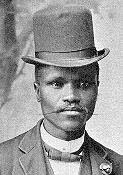Enoch Sontonga facts for kids
Quick facts for kids
Enoch Mankayi Sontonga
|
|
|---|---|
 |
|
| Background information | |
| Born | 1873 Uitenhage, Cape Colony |
| Origin | Transvaal |
| Died | 18 April 1905 (aged 32) Johannesburg, Transvaal Colony |
| Occupation(s) | Music composer |
Enoch Mankayi Sontonga (around 1873 – April 18, 1905) was a South African composer. He is famous for writing the song "Nkosi Sikelel' iAfrika", which means "God Bless Africa".
This song became part of the national anthem of South Africa in 1994. Before that, it was the official song for the African National Congress (ANC) starting in 1925.
Contents
Early Life and Education
Enoch Sontonga was a Xhosa man. He was born in a city called Uitenhage in the Eastern Cape Colony.
He studied to become a teacher at the Lovedale Institution. After his training, he worked as a teacher for eight years. He was also a choirmaster at a Methodist Mission school in Nancefield, near Johannesburg.
Creating a Famous Song
Sontonga wrote the first part of "Nkosi Sikelel' iAfrika" in 1897. He originally planned for it to be a song for schools.
Some people believe he wrote the music for the song that same year. However, others think the tune was already written by Joseph Parry as "Aberystwyth". They believe Sontonga only wrote new words for it.
The song was first sung in public in 1899. This happened at the special ceremony for Reverend Mboweni. He was the first Tsonga Methodist minister. Later, a Xhosa poet named Samuel Mqhayi added seven more verses to the song.
Enoch Sontonga passed away in April 1905.
Family Life
Sontonga was married to Diana Mngqibisa. They had one son together. His wife, Diana, died in 1929.
Lasting Impact and Legacy
The song "Nkosi Sikelel' iAfrika" became more widely known. This happened after the choir from John Langalibalele Dube's Ohlange Institute started using it.
They performed the song at a meeting of the South African Native National Congress in 1912. It was sung after the closing prayer. The ANC then made it their official closing song in 1925.
The song was recorded in London in 1923. It was officially published by the Lovedale Press in 1927.
For many years, no one knew where Sontonga was buried. But in the early 1990s, his grave was found. It was in the "Native Christian" part of the Braamfontein cemetery. One reason it was hard to find was that it was listed under "Enoch" instead of "Sontonga".
On September 24, 1996, Sontonga's grave was made a national monument. A special memorial was also revealed at the site. Nelson Mandela, who was the President at the time, was there.
At the same ceremony, Enoch Sontonga was given a special award. It was called the South African Order of Meritorious Service (Gold). He received it after his death.
See also
 In Spanish: Enoch Sontonga para niños
In Spanish: Enoch Sontonga para niños
 | William Lucy |
 | Charles Hayes |
 | Cleveland Robinson |

